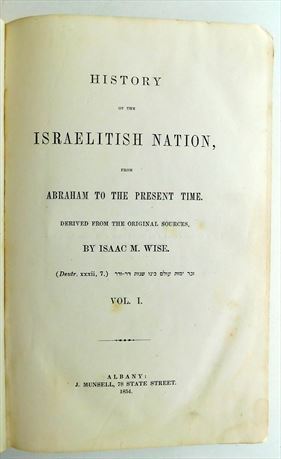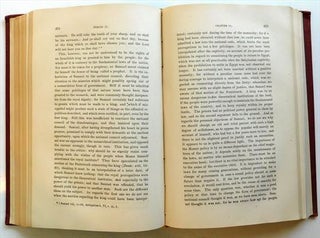HISTORY OF THE ISRAELITISH NATION: FROM ABRAHAM TO THE PRESENT TIME ... VOL. I (COMPLETE NO MORE PUBLISHED)
Albany: J. Munsell, 1854. Item #41342
1st Edition. Singerman 1864. Original Boards. 8vo. [xxiv], 560 pages; 23 cm. In English. This is the first published work by Isaac Mayer Wise. Wise was an American Reform rabbi, editor, and author, and a founder of Hebrew Union College. "During his lifetime Isaac M. Wise was regarded as the most prominent Jew of his time in the United States. His genius for organization was of a very high order; and he was masterful, rich in resources, and possessed of an inflexible will. More than of any of his contemporaries, it may be said of him that he left the impress of his personality upon the development of Judaism in the United States. " (JE) The eight years of Isaac M. Wise's ministration in Albany may be considered the crucial period of his existence. It was during this time that he conceived the projects which he carried to such successful issue later. But it was also his storm and stress period. In October, 1846, 8 years prior to publication of this work, Wise was appointed rabbi of Congregation Beth-El of Albany, New York. He soon began making reforms. Congregation Beth-El was the first American synagogue to: - Count women in forming a minyan or religious quorum. - Allow men and women to sit together, in family pews. (Another source says this first happened in 1851, at Anshe Emeth.)- Eliminate Bar Mitzvah, which in Wise's view was meaningless because at that age a boy cannot understand Judaism, and replace it with a later and more informed confirmation, open to girls as well. and - Have a mixed-sex choir. Also , Wise had famously remarked in reply to a question, when he was in Charleston, South Carolina applying for another Rabbinate position (at Kahal Kadosh Beth Elohim) and lecturing on "The Poetry of the Hebrew Bible," that he did not believe in the coming of the Messiah or the resurrection of the dead; a letter from the Charleston congregation documenting these statements was published in a newspaper. The result of this was that in 1850 the trustees of the synagogue dismissed him, which Wise did not accept. At the following day's service, the first day of Rosh Hashanah, at the moment when the Torah scroll was being removed from the ark, an altercation broke out between opponents and defenders of Wise. The fracas was so pronounced that the Sheriff was called; the Sheriff cleared the synagogue, locked the doors, and took the keys. This was the end of Wise's position at Temple Beth-El.Supporters of Wise formed a new congregation, Anshe Emeth. Wise remained with this congregation until 1854, the year of publication of this work. In January 1852, Wise was Chaplain of the Legislature of the State of New York, a position supporters, including then-New York Senator William H. Seward, helped him get since Anshe Emeth was unable to pay a full salary. During this time Wise worked on his History of the Israelitish Nation, which he stated was based on "such facts as are able to stand the test of criticism", eliminating miracles, dogmas, and doctrines, and as a general principle distinguishing religion from history. Unable to find a publisher, he printed it at his own expense, with help from friends. As he put it, "it fell into the orthodox camps like a veritable bomb".Wise published a second volume of his History in 1867 under the title, "History of the Hebrews' second commonwealth : with special reference to its literature, culture, and the origin of rabbinism and Christianity" (Cincinnati, Ohio : Bloch, 1867). SUBJECT(S) : Jews -- History -- To 586 B. C. Ex-library with marks, wear to spine, good condition. (AMR-48-45B).
Price: $250.00



